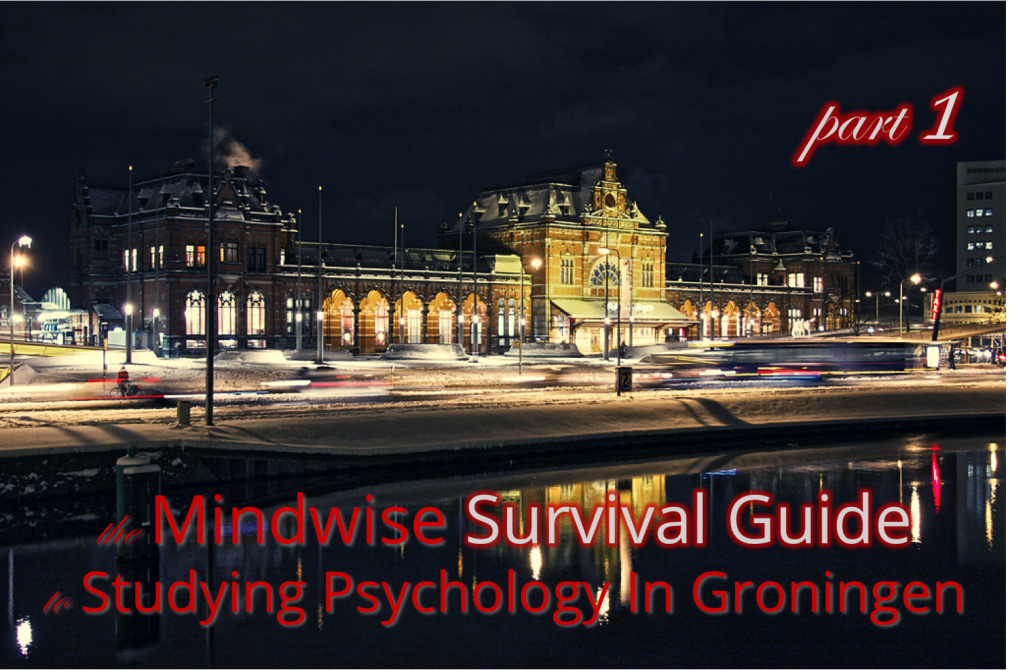
The Mindwise Survival Guide to Studying Psychology – Part 1
Moving to Groningen to study Psychology is an exciting time, but it can also be confusing. We’ve made it easier for you by asking students who have lived in Groningen for a while to share their top tips for learning the city, adjusting to studying at University, and navigating the Department, starting today with studying tips and some general useful advice.
What do you think? Is there something we’ve missed or neglected? Share your own advice in the comments section below!
Best spot for studying
Many different opinions were offered on where the best spot to study is.
According to Yavor, “This can vary greatly between individuals. I personally found my faculty’s library, or the comfort of my own home to be the places where I could do the most progress with studying. Groningen also has quite a few benches placed at lovely, quiet spots. Beware the almost constant wind blowing your pages, though.” Lena agrees that it “depends on your preferences (and your understanding of studying): the UB (main University Library), when you want to be sure to meet friends or acquaintances, the library and computer/laptop places at the BSS faculty [that’s our faculty, the Behavioural and Social Sciences – ed.] for a more peaceful atmosphere with a fantastic garden close by, or at home”. Hannes “prefer[s] to study at home”, a sentiment shared by Charlotte, but concedes that he “also really like[s] the atmosphere at the Heymans library”. The other option at the BSS Faculty is the new building across the garden from the main Psychology building, favoured by both Johannes and Lukas.
Besides our own faculty’s locations, Laura and Thole recommend the medical library at the UMCG, especially outside exam times; Katharina adds that the library at the Zernike campus provides a quiet space and Tim offers his favourite secret spot: the Bernoulliborg study room.
If you need a really quiet spot, Nikolai “recommend[s] renting out a study cabin in the University Library. Beware that during exam periods they are really booked so think about it on time’ and, if you make it into the Honours College, Thore recommends the Tower in the Academy Building.
And if all of this seems too complicated, Martin offers the most zen approach: “any clean desk with no distraction and a phone in flight mode”.
Where to buy books
There was really good consensus among all the recommendations. If you want to buy new books, most people suggested the VIP (“you get the whole package a bit cheaper”, says Sandy) and the Study Store next to the main library, or if you prefer shopping online, check out bol.com and Amazon.de.
Of course, you can get your books second-hand and there’s a lot of option offered here. Tim says “A lot of students sell their second-hand books via facebook groups, so be sure to join one. You will also have the opportunity to connect with fellow students besides meeting each other at lectures for example. This is the link for the 1st-year bachelor psychology students (2015-2016)”. Besides all the Facebook groups (there are many!), try tweedehandsstudieboeken.nl, bookmatch.nl, and marktplaats.nl
And don’t forget the library! Yavor’s advice is: “Use your Library Card! The University Library has a vast range of books that you could borrow and read. That’s what I did for the most part”.
What I wish someone had told me when I first arrived in Groningen
Flo is very concise: “DON´T BRING AN EXPENSIVE BIKE, but a good lock!” and many others agreed (“Invest the money in a good lock”, “don’t buy an expensive bike”). You’ll move around a lot on your bike, but Thore reminded us to “move in the city center. A 15min bike ride in Groningen is too far and nobody will ever visit you and you’ll feel like you don’t live in the same city as everybody else” (though, heed Hannes’s warning: “don’t live with 25 first-year students on one floor”) and Thole of the beauty of the nature around Groningen (“how beautiful the Hoornsemeer is”).
Speaking of housing, Tim says he wished someone had told him “Student rooms are often overpriced, and the rent can be lowered with the Student Law Agency ‘Bekijk Het’. They will look at your room and determine whether you pay too much. If you do, they will contact the landlord”.
Martin had hoped he’d known to “always take a towel with you, get rain-gear for your bike, learn Dutch, travel through the country, and don’t put your wet shoes on the radiator in class” (did I really have to say this to you? – ed.). Tim and Boris agree about learning Dutch (“You don’t have to learn Dutch at all, because everyone speaks English, but do it anyways as people will appreciate the effort and you will have way more opportunities to connect with the Dutch people!” and “learn Dutch, even though everyone speaks English. It opens many doors”).
And Nikolai, ruled by his stomach, wished he’d known “how good Papa Joe is. Their monthly special burgers are amazing!”
NOTE: Image by Michiel Jelijs, licenced under CC BY 2.0





Thanks a lot for doing this Tassos! 🙂 And a good start in the new academic year to everybody! <3